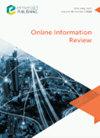Digital transformation: From hierarchy to network-based collaboration? The case of the German “Online Access Act”
IF 3.1
3区 管理学
Q2 COMPUTER SCIENCE, INFORMATION SYSTEMS
引用次数: 4
Abstract
To unlock the full potential of ICT-related public sector innovation and digital transformation, governments must embrace collaborative working structures and leadership, is commonly argued. However, little is known about the dynamics of such collaborations in contexts of hierarchy, silo cultures, and procedural accountability. A widely voiced but empirically insufficiently substantiated claim is that bringing cross-cutting digital endeavours forward requires more lateral, network-based approaches to governance beyond traditional Weberian ideals. We test this claim by shedding light on three distinct challenges (complexity, risk, and power imbalance) encountered when implementing the specific collaborative case of the German Online Access Act (OAA) and by examining how they have been addressed in institutional design and leadership. Our analysis, which combines desk research and semi-structured expert interviews, reveals that flexible, horizontal approaches are on the rise. Taking a closer look, however, vertical coordination continues to serve as complementary means to problem-solving capability.数字化转型:从层级到基于网络的协作?德国“在线访问法案”案例
人们普遍认为,为了释放与ict相关的公共部门创新和数字化转型的全部潜力,政府必须采用协作工作结构和领导力。然而,在等级制度、筒仓文化和程序问责的背景下,这种合作的动态知之甚少。一种广为流传但缺乏实证的说法是,要推动跨领域的数字化努力,需要超越传统韦伯理想的、更横向的、基于网络的治理方法。我们通过阐明在实施德国在线访问法案(OAA)的具体合作案例时遇到的三个不同的挑战(复杂性、风险和权力不平衡),并通过检查如何在制度设计和领导中解决这些挑战,来验证这一说法。我们的分析结合了桌面研究和半结构化的专家访谈,结果显示,灵活、横向的方法正在兴起。然而,仔细看一下,垂直协调仍然是解决问题能力的补充手段。
本文章由计算机程序翻译,如有差异,请以英文原文为准。
求助全文
约1分钟内获得全文
求助全文
来源期刊

Online Information Review
工程技术-计算机:信息系统
CiteScore
6.90
自引率
16.10%
发文量
67
审稿时长
6 months
期刊介绍:
The journal provides a multi-disciplinary forum for scholars from a range of fields, including information studies/iSchools, data studies, internet studies, media and communication studies and information systems.
Publishes research on the social, political and ethical aspects of emergent digital information practices and platforms, and welcomes submissions that draw upon critical and socio-technical perspectives in order to address these developments.
Welcomes empirical, conceptual and methodological contributions on any topics relevant to the broad field of digital information and communication, however we are particularly interested in receiving submissions that address emerging issues around the below topics.
Coverage includes (but is not limited to):
•Online communities, social networking and social media, including online political communication; crowdsourcing; positive computing and wellbeing.
•The social drivers and implications of emerging data practices, including open data; big data; data journeys and flows; and research data management.
•Digital transformations including organisations’ use of information technologies (e.g. Internet of Things and digitisation of user experience) to improve economic and social welfare, health and wellbeing, and protect the environment.
•Developments in digital scholarship and the production and use of scholarly content.
•Online and digital research methods, including their ethical aspects.
 求助内容:
求助内容: 应助结果提醒方式:
应助结果提醒方式:


